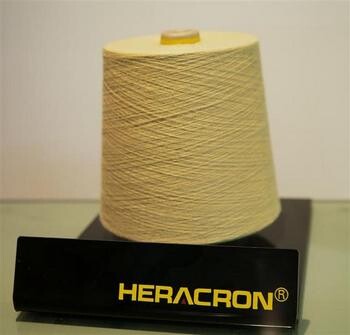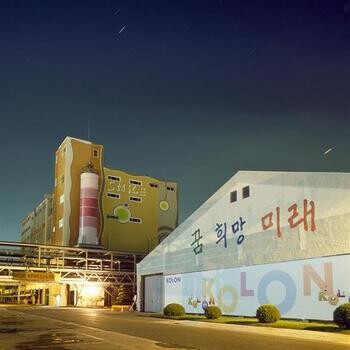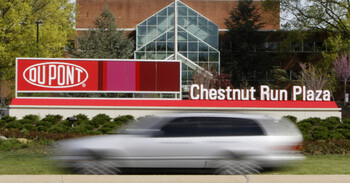hankyoreh
Links to other country sites 다른 나라 사이트 링크
Korean firm in legal battle against Dupont over ‘golden fiber’

By Lee Seung-jun, staff reporter
A thread of aramid fiber just 1.6mm thick can support a weight of 350kg. It is used to make bulletproof vests and helmets. It has also been suggested as a material for firefighting uniforms since it is five times the strength of steel and can withstand temperatures of up to 500 degrees Centigrade.
It’s been 50 years since Delaware-based company DuPont developed aramid fiber, called by some the “golden fiber” and “super fiber”. The market for the material grows fiercer by the day.
One example of this trend was a decision handed down August 31 (US time) by the US district court in Richmond, Virginia slapping a 20-year ban on global production, sales and marketing of Kolon Industries’ aramid fiber product “Heracron.”
DuPont had sued Kolon for violating trade secrets. The court has accepted Kolon’s request to suspend the ruling, so the Korean manufacturer will avoid having to suspend production for now.

However, the challenge for Kolon, a latecomer in the market, and the tensions that have erupted due to DuPont’s efforts to keep its challenger in check are racing towards an extreme. The global market for para-aramid fiber (used mostly in bulletproof vests), which Kolon produces, is currently 1.7 trillion won (about US$1.5 billion) and growing.
The tensions between the two companies are due to the character of the aramid fiber industry. It is also a fairly closed market, with US-based DuPont (46%) and Japan’s Teijin (44%) accounting for about 90% of the market and latecomers Kolon (5,000t) and Hyosung (1,000t) accounting for 10%.
Aramid fiber currently accounts for just 2% of Kolon’s total sales, and the company’s sales in the US market amount to just 3.3 billion won (about US$2.9 billion), but the Korean manufacturer has been cultivating aramid textiles as a next-generation business.
The tensions between Kolon and DuPont go back 30 years. The late Yoon Han-shik, a Korea Institute of Science and Technology (KIST) researcher whose research into producing aramid fiber domestically began in 1979, received a US product patent for aramid fiber in 1985 with support from Kolon.
Later, he received patents in seven other countries, including Great Britain, Japan and Germany. In the process, DuPont offered to start a joint venture with Kolon, but the two sides weren’t able to agree on terms.
DuPont responded in 1986 by launching - with Dutch firm AkzoNobel - a patent violation suit at the European Patent Office against Yoon.
In December 1991, a European appeals court ruled that Yoon’s research was original, but the war continued.
Kolon jumped into full-scale aramid production, but experienced difficulty getting the raw materials. At the time, the Korean press reported that DuPont had pressured AkzoNobel, the producer of the raw material for aramid, not to supply the materials to Kolon.
In an interview in the Jan 21, 1994 edition of the Dong-A Ilbo, Yoon said, “We could monopolize this technology by 2002, but far from competing in the market with DuPont, we’re just wasting time day to day.”
Tensions flared once again when, after a series of ups and downs including an investment suspension due to the 1997 Asian financial crisis, Kolon began commercial production of aramid fiber in 2005, becoming the world’s third largest producer behind DuPont and Teijin with 500 tons that year.
Kolon said DuPont began moves to keep the Korean producer in check as Kolon sales grew upon its entry into the US market in 2006. DuPont made an issue of Kolon’s hiring in 2007 of consultant Michael Mitchell, a 24-year veteran of DuPont.

DuPont informed the FBI and US Justice Department and launched a suit. In September of last year, American jurors ordered Kolon to pay US$919.9 million in damages. The court confirmed the decision in November. It was a huge sum that included even DuPont’s product R&D costs.
Kolon admitted it hired former DuPont employees, but claimed the hiring of former employees of other firms was industry practice. It also argued that it never received any trade secrets from Mitchell, and that the 149 trade secrets DuPont claimed were violated were already public knowledge.
Kolon has also raised doubts about the first trial being held in Richmond, Virginia, the site of a DuPont factory, and judge Robert Payne’s 21-year stint at the law firm McGuire Woods prior to becoming a judge. McGuire Woods has enjoyed a relationship with DuPont. Kolon’s legal team asked the court to provide a different judge, but was turned down.
Kolon also filed an antitrust claim at a US court against DuPont, which controls over 80% of the US market, but this was dismissed in July. An appeal is currently ongoing.
DuPont filed a petition against Kolon for trade secret violation at Seoul Central District Prosecutors’ Office in 2010. Prosecutors decided to stop calling in witnesses in March, ending its investigation without a ruling.
In a September 1 statement, DuPont welcomed the decision, saying, “The judge’s order sends a clear message to Kolon and others that they cannot benefit from the theft of our trade secrets.”
Kolon, on the other hand, made clear it would appeal the verdict, saying, “We have sufficient grounds to set right the results of the first trial in an appeal.”
Please direct questions or comments to [english@hani.co.kr]

Editorial・opinion
![[Column] Season 2 of special prosecutor probe may be coming to Korea soon [Column] Season 2 of special prosecutor probe may be coming to Korea soon](https://flexible.img.hani.co.kr/flexible/normal/500/300/imgdb/original/2024/0426/3317141030699447.jpg) [Column] Season 2 of special prosecutor probe may be coming to Korea soon
[Column] Season 2 of special prosecutor probe may be coming to Korea soon![[Column] Park Geun-hye déjà vu in Yoon Suk-yeol [Column] Park Geun-hye déjà vu in Yoon Suk-yeol](https://flexible.img.hani.co.kr/flexible/normal/500/300/imgdb/original/2024/0424/651713945113788.jpg) [Column] Park Geun-hye déjà vu in Yoon Suk-yeol
[Column] Park Geun-hye déjà vu in Yoon Suk-yeol- [Editorial] New weight of N. Korea’s nuclear threats makes dialogue all the more urgent
- [Guest essay] The real reason Korea’s new right wants to dub Rhee a founding father
- [Column] ‘Choson’: Is it time we start referring to N. Korea in its own terms?
- [Editorial] Japan’s rewriting of history with Korea has gone too far
- [Column] The president’s questionable capacity for dialogue
- [Column] Are chaebol firms just pizza pies for families to divvy up as they please?
- [Column] Has Korea, too, crossed the Rubicon on China?
- [Correspondent’s column] In Japan’s alliance with US, echoes of its past alliances with UK
Most viewed articles
- 1‘We must say no’: Seoul defense chief on Korean, USFK involvement in hypothetical Taiwan crisis
- 2[Column] Season 2 of special prosecutor probe may be coming to Korea soon
- 3N. Korean delegation’s trip to Iran shows how Pyongyang is leveraging ties with Moscow
- 4Amnesty notes ‘erosion’ of freedom of expression in Korea in annual human rights report
- 5[Reportage] On US campuses, student risk arrest as they call for divestment from Israel
- 6Korea sees more deaths than births for 52nd consecutive month in February
- 7[Editorial] New weight of N. Korea’s nuclear threats makes dialogue all the more urgent
- 8‘Weddingflation’ breaks the bank for Korean couples-to-be
- 9[Column] Has Korea, too, crossed the Rubicon on China?
- 10[Column] Park Geun-hye déjà vu in Yoon Suk-yeol